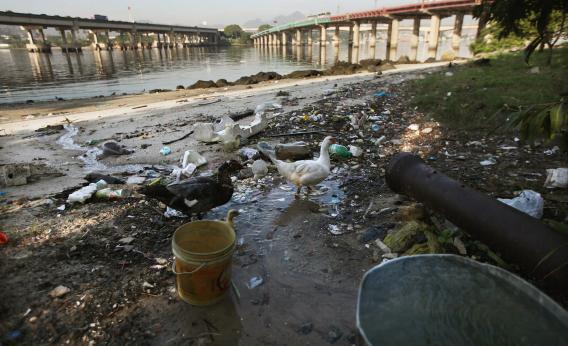Tens of thousands of people are gathering in Rio de Janeiro for this week’s U.N. Earth Summit. The participants, ranging from weary politicians to enthusiastic campaigners, are supposed to reignite global concern for the environment. Unfortunately, the summit is likely to be a wasted opportunity.
The United Nations is showcasing the alluring promise of a “green economy,” focused on tackling global warming. In fact, the summit is striking at the wrong target, neglecting the much greater environmental concerns of the vast majority of the world.
Global warming is by no means our main environmental threat. Even if we assumed—unreasonably—that it caused all deaths from floods, droughts, heat waves, and storms, this total would amount to just 0.06 percent of all deaths in developing countries. In comparison, 13 percent of all Third World deaths result from water and air pollution.
So, for each person who might die from global warming, about 210 people die from health problems that result from a lack of clean water and sanitation, from breathing smoke generated by burning dirty fuels (such as dried animal dung) indoors, and from breathing polluted air outdoors.
By focusing on measures to prevent global warming, the advanced countries might help to prevent many people from dying. That sounds good until you realize that it means that 210 times as many people in poorer countries might die needlessly as a result—because the resources that could have saved them were spent on windmills, solar panels, biofuels, and other rich-world fixations.
But of course, poor countries’ tangible pollution problems are not trendy, and they do not engage outspoken campaigners, media, and governments the way that global warming can.
Nowhere are the failed priorities better illustrated than in the United Nations’ official, colorful “Rio+20” leaflet. Here, the U.N. helpfully provides a layman’s explanation of the summit, along with examples of its envisioned “green economy” in action. We see scary pictures of dry riverbeds (the result of global warming), along with plenty of pretty solutions like wind turbines and solar panels.
The problem is that green energy mostly is still much more expensive, less effective, and more intermittent than the alternatives. Yet, the summit literature claims that it will boost economic growth and eradicate poverty. But seriously, why do well-meaning First Worlders think that the Third World should have energy technologies that are more expensive, feebler, and less reliable than their own?
Without a hint of irony, the leaflet is called “The Future We Want.” But, in a world where 1 billion people go to bed hungry, and where 6 million die each year from air and water pollution, most of those in the developing world likely have a very different set of priorities for their future.
The leaflet cheerfully claims that China’s shift “to a low-carbon growth strategy based on the development of renewable energy sources [has] created jobs, income, and revenue.” In fact, over the past 25 years, China has quadrupled its CO2 emissions. While China does produce about half of the world’s solar panels, 98 percent are exported to reap generous subsidies from rich-world markets. Only 0.005 percent of China’s energy comes from solar panels. China’s decades-long economic expansion has lifted 600 million people out of poverty, but the enormous pollution that this has entailed does not fit into Rio+20’s green narrative.
Likewise, the brochure explains that some farmers in Uganda have embraced organic farming. Unfortunately, Africa is almost entirely organic now—leading to low yields, hunger, and deforestation. Africa needs to boost its yields, and that means enabling farmers to use modern crops, fertilizers, and pesticides. Producing less with more effort might appeal to well-fed First Worlders, but it is literally starving the poor.
Reading further, the leaflet gushes that France has created 90,000 jobs in the green economy. But the stark reality remains hidden: The average cost of each green job is more than $200,000 per year, which French taxpayers patently cannot afford. And economic models show that France has lost as many or more jobs because of the extra costs of the subsidies.
Adding insult to injury, a beautiful photograph shows electric cars finishing the “Zero Emissions Race” in Geneva. Omitted is the fact that most electricity still comes from burning fossil fuels, so the cars are anything but “zero” emissions. And, more importantly, most of our planet’s inhabitants still dream of owning some form of mechanized transport—which is unlikely to be an electric vehicle with a price tag of $50,000 or more.
In a world plagued by serious problems caused by air and water pollution, this breezy focus on trendy topics and unrealistic solutions is deeply disturbing. A disconnected global elite is flying to Rio to tell the world’s poor to have a solar panel.
Rather than pandering to advanced countries’ obsessions, Rio+20 could do more good for humanity—and the planet—by focusing on the top environmental problems and their simple solutions.
